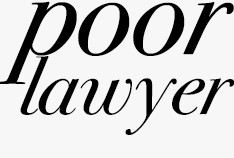When
1. When did you start this blog?
I have kept an online journal (the “Blog”) since I was thirteen. The Blog has taken many different forms over the years. In high school, the Blog was hosted on LiveJournal and documented the tedious life of a quiet Vietnamese-American teenager living in Texas suburbia. In college, the Blog moved to WordPress when I moved to New England; and the writing focused on homesickness and the strange world of an Ivy League school. When I started law school, I moved everything to Tumblr, which is where the entries are currently housed. This current domain (“Poor Lawyer”) originated in 2014, when I moved to New York City to start work at a law firm.
Why
2. Why do you write?
Writing has always been a passion of mine. At an early age, I kept a journal in tattered composition books. The Blog started off as a means to more scrupulously document the details of my everyday life. To be fair, I still think that the Blog is a faithful chronicle of fairly mundane events and personal experiences. I try to write every day. I’ve always been fascinated by history and memory — primarily how ossifying memories through writing can preserve history. A part of me feels that that which has failed to be documented will someday be forgotten, which makes me immeasurably sad. So, that’s why I keep this huge repository of papered memories forever in stock: some memories, admittedly, more beautiful and glistening than others.
Name
3. What does ‘Poor Lawyer’ mean?
The name is a double entendre. On one hand, it describes ‘poor’ in a financial sense. As a first-generation immigrant to the United States, I grew up with little means. I was raised poor and have always identified with poverty. In many ways, I work hard to pay respect to the struggles and sacrifices of my working class parents. (Moreover, the juxtaposition between Millenials’ crippling student debt and the golden blessing of landing highly-compensated jobs was a fascinating paradox to me.) Conversely, ‘Poor Lawyer’ is somewhat tongue-in-cheek: a sarcastic, albeit exasperated, plea—a conceit begging for sympathy and simultaneous understanding that the realities of the lives of others are not always as simplistic or winsome as they may appear.
